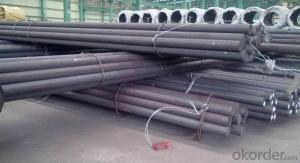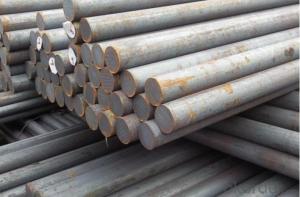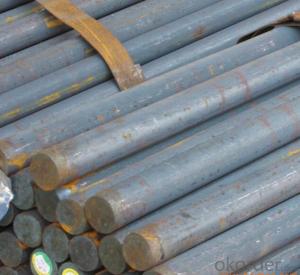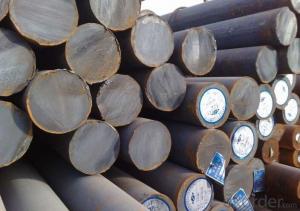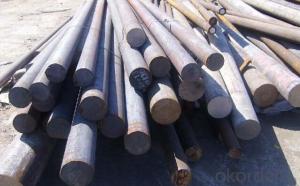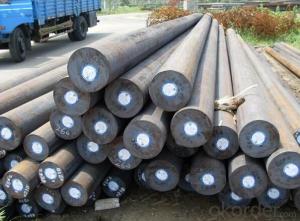Grade DIN 20Cr4 CNBM Alloy Steel Round Bar Made in China
- Loading Port:
- Shanghai
- Payment Terms:
- TT OR LC
- Min Order Qty:
- 3 m.t.
- Supply Capability:
- 10000 m.t./month
OKorder Service Pledge
OKorder Financial Service
You Might Also Like
Item specifice
Product Description
1. Diameter: 8mm-250mm rou
2. Length: 2m, 3m, 5.8m, 6m or customized
3. Standard: GB, ASTM, AISI, SAE, DIN, JIS, EN
4. Produce Process: smelt iron - EAF smelt billet - ESR smelt billet -hot rolled or forged -steel round bar and plate
5. Heat Treatment: annealing, normalizing, tempering, quenching
6. Surface Treatment: Black, Polished, Galvanized
7. Quality Assurance: We accept third party inspection for all orders.
You can ask testing organizations such as SGS, BV, etc. to test our products before shipping.
Chemical Composition
Grade | Dia.(mm) | C | Si | Mn | Cr | P | S | Ni | Cu |
5120 | 16-85 | 0.18-0.24 | 0.17-0.37 | 0.50-0.80 | 0.70-1.00 | ≤0.035 | ≤0.035 | ≤0.03 | ≤0.03 |
5140 | 16-400 | 0.37-0.44 | 0.17-0.37 | 0.50-0.80 | 0.80-1.10 | ≤0.035 | ≤0.035 | ≤0.30 | ≤0.03 |
4135 | 13-230 | 0.32-0.40 | 0.17-0.37 | 0.40-0.70 | 0.80-1.10 | ≤0.035 | ≤0.035 | ≤0.03 | ≤0.03 |
4140 | 13-360 | 0.38-0.45 | 0.17-0.37 | 0.50-0.80 | 0.90-1.20 | ≤0.035 | ≤0.035 | ≤0.03 | ≤0.03 |
Application:
Mechanism & Fasteners gear,
Stressed components for vehicles
Engines and machines
Parts of larger cross-section
Company Information:
CNBM International Corporation is the most important trading platform of CNBM group.
Whith its advantages, CNBM International are mainly concentrate on Cement, Glass, Iron and Steel, Ceramics industries and devotes herself for supplying high qulity series of refractories as well as technical consultancies and logistics solutions.
Packing & Delivery
1. Packaging: seaworthy package or as required
2. Delivery: 35-45 days or based on quantity
Product Show
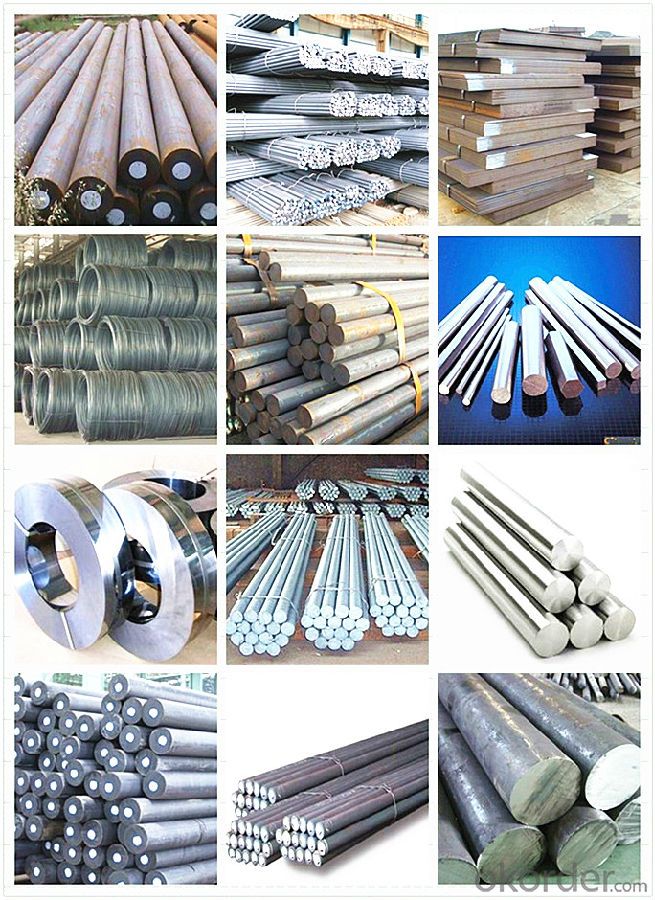
FAQ:
1.Your advantages?
Professional products inquiry, products knowledge train (for agents), smooth goods delivery, excellent
customer solution proposale
2. Test & Certificate?
SGS test is available, customer inspection before shipping is welcome, third party inspection is no problem
3. Factory or Trading Company?
CNBM is a trading company but we have so many protocol factories and CNBM works as a trading department
of these factories. Also CNBM is the holding company of many factories.
4. Payment Terms?
30% TT as deposit and 70% before delivery.
Irrevocable L/C at sight.
5. Trading Terms?
EXW, FOB, CIF, FFR, CNF
6. After-sale Service?
CNBM provides the services and support you need for every step of our cooperation. We're the business
partner you can trust.
For any problem, please kindly contact us at any your convenient time.
We'll reply you in our first priority within 24 hours.
- Q:How does special steel perform in cryogenic wear resistance?
- Special steel is known for its exceptional performance in cryogenic wear resistance. When exposed to extremely low temperatures, special steel maintains its strength, hardness, and durability, making it highly resistant to wear and friction. This is particularly important in applications that involve cryogenic environments, such as in the aerospace industry or in the production of superconductors. The unique composition and processing of special steel enable it to withstand the challenges posed by cryogenic conditions. It exhibits excellent toughness, ensuring that it does not become brittle or prone to cracking at low temperatures. Additionally, the steel's microstructure remains stable, preventing any significant changes in its mechanical properties when subjected to extreme cold. Furthermore, special steel is often treated with various surface coatings or heat treatments to enhance its wear resistance even further. These treatments create a protective layer or modify the steel's microstructure, reducing the likelihood of wear and extending its service life in cryogenic environments. In summary, special steel excels in cryogenic wear resistance due to its ability to maintain strength, hardness, and durability at extremely low temperatures. Its exceptional toughness, stable microstructure, and potential for surface treatments make it a preferred choice for applications that require reliable performance in cryogenic conditions.
- Q:How are nickel-based alloys used in the aerospace industry?
- Nickel-based alloys are extensively used in the aerospace industry due to their superior strength, high temperature resistance, and excellent corrosion resistance properties. These alloys are commonly employed in the construction of aircraft engines, turbine blades, and exhaust systems. They help improve engine efficiency, enhance fuel economy, and ensure safe and reliable operations in extreme conditions, making them crucial for the advancement of aerospace technology.
- Q:Can special steel be used in the mining equipment manufacturing industry?
- Yes, special steel can be used in the mining equipment manufacturing industry. Special steel, often known as alloy steel, offers improved strength, durability, and resistance to wear and corrosion compared to standard steel. These properties make it well-suited for the harsh and demanding conditions encountered in mining operations. Special steel can be utilized in various mining equipment components, such as drill bits, crushers, conveyor systems, and excavator buckets, to enhance their performance and prolong their lifespan.
- Q:How does special steel contribute to the electrical resistance of products?
- Special steel can contribute to the electrical resistance of products in several ways. Firstly, the composition of special steel can be tailored to have specific electrical properties, such as resistivity. By selecting the appropriate alloys and adjusting the carbon content, special steel can be made to have higher resistivity than regular steel or other materials. This higher resistivity is beneficial in applications where electrical conductivity needs to be limited. For example, in electrical wiring, the use of special steel with higher resistivity can help to prevent excessive current flow, reducing the risk of overheating and potential electrical hazards. Similarly, in electrical resistors, the use of special steel can provide the desired level of resistance to control the flow of current and dissipate energy in a controlled manner. Special steel can also contribute to electrical resistance through its physical properties. The microstructure of special steel can be engineered to enhance resistance to electrical current flow. For instance, the addition of certain alloying elements or heat treatment processes can create a fine-grained structure or introduce barriers to electron movement, increasing the overall resistance. Furthermore, special steel can be used in the production of electrical contact materials. These materials need to have specific electrical and mechanical properties to ensure reliable and efficient electrical connections. Special steel alloys can provide high electrical conductivity while also being resistant to corrosion, wear, and deformation, thus contributing to the overall electrical resistance of the product. In summary, special steel contributes to the electrical resistance of products through its tailored composition, which can provide higher resistivity than regular steel. Additionally, the microstructure of special steel can be engineered to enhance resistance to electrical current flow. Whether it is used for limiting current flow, controlling resistance, or creating reliable electrical contacts, special steel plays a crucial role in various electrical applications.
- Q:What are the common grades of special steel?
- The common grades of special steel vary depending on the specific application and desired properties. Some of the commonly used grades include: 1. Stainless steel: This is a corrosion-resistant steel alloy that contains a minimum of 10.5% chromium. Grades such as 304, 316, and 410 are commonly used in various industries due to their excellent corrosion resistance, high strength, and good formability. 2. Tool steel: These grades are specifically designed for toolmaking and are known for their high hardness, wear resistance, and toughness. Common tool steel grades include D2, A2, O1, and S7, each having specific properties suitable for different applications. 3. High-speed steel (HSS): HSS is a type of tool steel that can retain its hardness and cutting ability even at high temperatures. It is commonly used in cutting tools such as drills, end mills, and taps. M2, M35, and M42 are some of the common grades of HSS. 4. Alloy steel: As the name suggests, alloy steel is made by adding different alloying elements to enhance specific properties. Grades such as 4140, 4340, and 8620 are commonly used due to their high strength, toughness, and wear resistance. They find applications in industries like automotive, aerospace, and machinery. 5. Spring steel: Spring steel is known for its ability to return to its original shape after being bent or twisted. Grades like 1095 and 5160 are commonly used in the manufacturing of springs, suspension components, and hand tools. These are just a few examples of the common grades of special steel. There are numerous other grades available, each with unique properties and applications. It is important to select the appropriate grade based on the specific requirements of the intended use.
- Q:What are the different mechanical properties of special steel?
- Special steels exhibit a diverse array of mechanical characteristics that render them distinctive and well-suited for specific uses. Among the noteworthy mechanical properties of special steel are its exceptional strength, impressive toughness, commendable wear resistance, and superior corrosion resistance. Of all these properties, high strength emerges as a particularly crucial attribute of special steel. This inherent strength enables the material to withstand substantial loads and stress without succumbing to deformation or failure. As a result, special steel finds application in areas where the preservation of structural integrity and durability holds paramount importance, such as in the construction of buildings, bridges, and machinery. Another significant mechanical property of special steel lies in its toughness. This quality refers to the material's ability to absorb energy and withstand fracture when subjected to impact or sudden loads. Special steels possessing high toughness become indispensable in applications involving dynamic and high-impact forces, such as the fabrication of tools, gears, and machinery components. Wear resistance constitutes yet another critical mechanical property of special steel. It denotes the material's capacity to endure damage and deterioration caused by friction, abrasion, or erosion. Special steel boasting good wear resistance frequently finds employment in scenarios where it will be exposed to harsh conditions or repetitive mechanical actions, as witnessed in the manufacturing of cutting tools, dies, and molds. Of equal importance is the superior corrosion resistance offered by special steel. This mechanical property proves invaluable, particularly in environments where exposure to moisture, chemicals, or extreme temperatures looms likely. Special steels endowed with high corrosion resistance can withstand the adverse effects of oxidation, rust, and chemical reactions, rendering them eminently suitable for deployment in industries such as marine, chemical, and oil and gas. In conclusion, special steels possess a diverse range of mechanical properties that distinguish them from conventional steels. High strength, remarkable toughness, commendable wear resistance, and superior corrosion resistance represent a few of these key mechanical properties, rendering special steel the preferred choice for numerous industrial applications.
- Q:Are there any international standards for special steel?
- Yes, there are international standards for special steel. These standards are developed and maintained by various organizations such as the International Organization for Standardization (ISO) and the American Society for Testing and Materials (ASTM). These standards ensure that the special steel products meet specific criteria for their composition, properties, and performance, enabling global consistency and compatibility in the industry.
- Q:What are the factors that affect the fatigue strength of special steel?
- The factors that affect the fatigue strength of special steel include the composition of the steel, the heat treatment process used, the presence of impurities or defects, the surface finish, the loading conditions, and the operating environment.
- Q:How does the hardness of special steel affect its performance?
- The hardness of special steel plays a crucial role in determining its performance. The hardness of steel refers to its ability to resist indentation, scratching, or deformation during use. This property is directly related to the steel's microstructure and the amount of carbon present in it. When special steel is hardened, it undergoes a process called heat treatment, typically involving rapid cooling or quenching after being heated to high temperatures. This process alters the steel's microstructure, resulting in a harder material. The increased hardness provides several benefits to the performance of special steel. Firstly, a higher hardness level enhances the wear resistance of special steel. This is particularly important in applications where the steel is subjected to abrasive or erosive forces, such as cutting tools or machinery components. A harder steel can withstand these forces without significant wear or damage, resulting in improved longevity and reliability. Secondly, the hardness of special steel affects its strength and toughness. A harder steel generally exhibits higher strength, meaning it can withstand greater forces without permanent deformation or failure. This property is advantageous in applications where the steel is subjected to heavy loads or impacts. Additionally, a certain level of toughness is necessary to prevent brittle fractures. While high hardness can make a steel more brittle, careful heat treatment can balance the hardness and toughness, ensuring the steel remains strong and resistant to fracture. Furthermore, the hardness of special steel also affects its machinability. Hardened steel can be more challenging to machine due to its increased resistance to cutting tools. However, it offers greater dimensional stability and precision during machining operations, leading to more accurate and consistent results. In summary, the hardness of special steel significantly impacts its performance. A higher hardness level provides improved wear resistance, strength, and toughness, making it suitable for demanding applications. However, the balance between hardness and toughness needs to be carefully considered to avoid brittleness. Therefore, understanding and controlling the hardness of special steel is essential to optimize its performance in various industries.
- Q:What are the properties of corrosion-resistant alloy steel?
- Corrosion-resistant alloy steel possesses properties such as high resistance to corrosion, excellent strength, durability, and the ability to withstand harsh environmental conditions. It is resistant to rust, corrosion, and oxidation, making it ideal for applications in industries such as marine, chemical, and oil and gas. The alloy steel also offers good mechanical properties, including high tensile strength and toughness, which ensures its long-term performance and reliability.
1. Manufacturer Overview |
|
|---|---|
| Location | |
| Year Established | |
| Annual Output Value | |
| Main Markets | |
| Company Certifications | |
2. Manufacturer Certificates |
|
|---|---|
| a) Certification Name | |
| Range | |
| Reference | |
| Validity Period | |
3. Manufacturer Capability |
|
|---|---|
| a)Trade Capacity | |
| Nearest Port | |
| Export Percentage | |
| No.of Employees in Trade Department | |
| Language Spoken: | |
| b)Factory Information | |
| Factory Size: | |
| No. of Production Lines | |
| Contract Manufacturing | |
| Product Price Range | |
Send your message to us
Grade DIN 20Cr4 CNBM Alloy Steel Round Bar Made in China
- Loading Port:
- Shanghai
- Payment Terms:
- TT OR LC
- Min Order Qty:
- 3 m.t.
- Supply Capability:
- 10000 m.t./month
OKorder Service Pledge
OKorder Financial Service
Similar products
New products
Hot products
Related keywords
